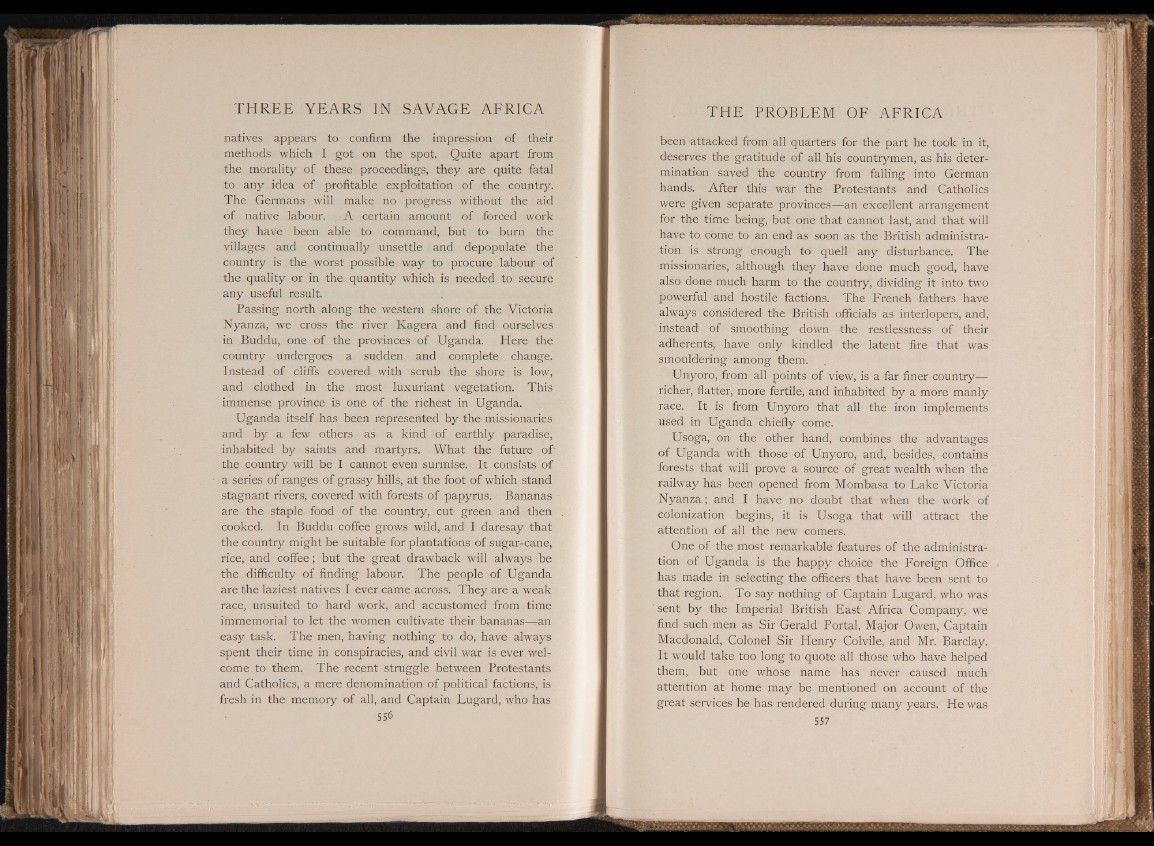
natives appears to confirm the impression of their
methods which I got on the spot. Quite apart from
the morality of these proceedings, they are quite fatal
to any idea of profitable exploitation of the country.
The Germans will make no progress without the aid
of native labour. A certain amount of forced work
they have been able to command, but to burn the
villages and continually unsettle and depopulate the
country is the worst possible way to procure labour of
the quality or in the quantity which is needed to secure
any useful result.
Passing north along the western shore of the Victoria
Nyanza, we cross the river Kagera and find ourselves
in Buddu, one of the provinces of Uganda. Here the
country undergoes a sudden and complete change.
Instead of cliffs covered with scrub the shore is low,
and clothed in the most luxuriant vegetation. This
immense province is one of the richest in Uganda.
Uganda itself has been represented by the missionaries
and by a few others as a kind of earthly paradise,
inhabited by saints and martyrs. What the future of"
the country will be I cannot even surmise. It consists of
a series of ranges of grassy hills, at the foot of which stand
stagnant rivers, covered with forests of papyrus. Bananas
are the staple food of the country, cut green and then
cooked. In Buddu coffee grows wild, and I daresay that
the country might be suitable for plantations of sugar-cane,
rice, and coffee; but the great drawback will always be
the difficulty of finding labour. The people of Uganda
are the laziest natives I ever came across. They are a weak
race, unsuited to hard work, and accustomed from time
immemorial to let the women cultivate their bananas—ran
easy task. The men, having nothing to do, have always
spent their time in conspiracies, and civil war is ever welcome
to them. The recent struggle between Protestants
and Catholics, a mere denomination of political factions, is
fresh in the memory of all, and Captain Lugard, who has
556
been attacked from all quarters for the part he took in it,
deserves the gratitude of all his countrymen, as his determination
saved the country from falling into German
hands. After this war the Protestants and Catholics
were given separate provinces—an excellent arrangement
for the time being, but one that cannot last, and that will
have to come to an end as soon as the British administration
is strong enough to quell any disturbance. The
missionaries, although they have done much good, have
also done much harm to the country, dividing it into two
powerful and hostile factions. The French fathers have
always considered the British officials as interlopers, and,
instead of smoothing down the restlessness of their
adherents, have only kindled the latent fire that was
smouldering among them.
Unyoro, from all points of view, is a far finer country—
richer, flatter, more fertile, and inhabited by a more manly
race. It is from Unyoro that all the iron implements
used in Uganda chiefly come.
Usoga, on the other hand, combines the advantages
of Uganda with those of Unyoro, and, besides, contains
forests that will prove a source of great wealth when the
railway has been opened from Mombasa to Lake Victoria
Nyanza; and I have no doubt that when the work of
colonization begins, it is Usoga that will attract the
attention of all the new comers.
One of the most remarkable features of the administration
of Uganda is the happy choice the Foreign Office
has made in selecting the officers that have been sent to
that region. To say nothing of Captain Lugard, who was
sent by the Imperial British East Africa Company, we
find such men as Sir Gerald Portal, Major Owen, Captain
Macdonald, Colonel Sir Henry Colvile, and Mr. Barclay.
It would take too long to quote all those who have helped
them, but one whose name has never caused much
attention at home may be mentioned on account of the
great services he has rendered during many years. He was